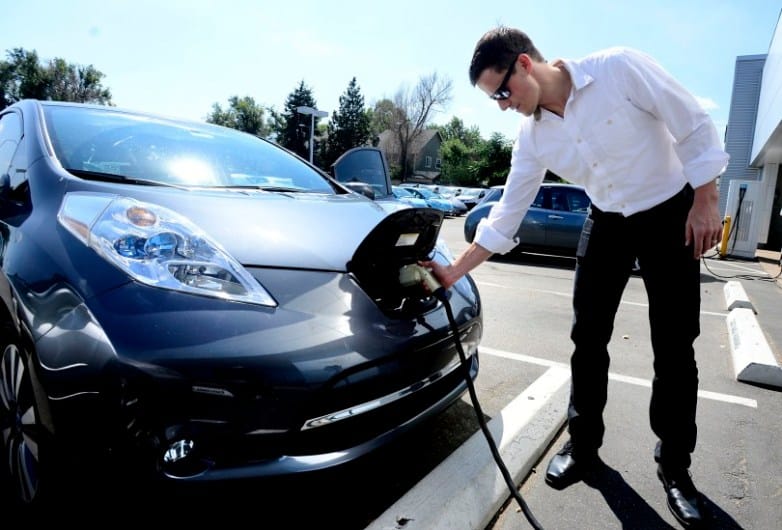At the end of 2015, my wife and I were suddenly in the market for two cars at the same time. Being folks of average incomes, we weren’t really prepared to buy two new cars outright, but if we wanted to get to work and do all the things that life in Colorado requires, we both needed new rides.
We went to different dealerships looking for at least one hybrid, because we’re budget conscious — and, of course, saving money on gas doesn’t just make environmental sense, it makes financial sense too. But we didn’t love the hybrids that were on the market at the time. Instead, we found ourselves at a dealership where we were able to get two cars financed in the range we could afford. One of them was the previous year’s model Nissan Leaf.
Federal and state tax credits at the time made our electric car affordable. If you’ve never driven an electric car, I strongly recommend you give one a spin. We call it the “space mobile” because it has the pickup of a rocketship, and the low humming whirr of the electric engine really gives you the sense that you’re driving something futuristic. Plus, our overall electricity bill barely changed once we started charging it every night, and I can get to and from work and run errands all over the metro area without worrying about running out of batteries.
The average person driving the average electric vehicle (EV) 15,000 miles per year will pay about $540 to charge it. Compare that to the average American who uses 500 gallons of gasoline per year, at a 2019 average in Colorado of $2.66 per gallon, costing roughly $1,330 per year.
It’s easy to see why consumers are choosing to stop getting gouged at the pump. Today, with available incentives, there are plenty of models that are cheaper than the average cost of a new gasoline-powered car.
Thanks to my own positive experience, I’m now an electric car evangelist. While consultants for the auto dealers spend their time trashing EVs on Twitter, innovative businesses like K2 taxi in Grand Junction are building entire fleets of EV cabs, saving them tons of money on maintenance, and allowing them to rapidly expand their fleet with the savings from no more gasoline or oil changes. I’ve found that the only people who hate electric cars are those who are paid to do so or were given bad information by someone who was paid to do so.
Colorado is about to enter into a rulemaking process in which the future of the availability of EVs in Colorado will be decided. This rulemaking process focuses on a new zero-emission vehicle standard to bring more zero-emission vehicles to the state. It follows the Air Quality Control Commission’s decision to put into place low-emission vehicle standards last November.
The Colorado Auto Dealers sued the state to prevent those standards last year, but the suit was tossed out. The car dealers couldn’t prove that the new standards would harm their interests, and, if these new rules are adopted, not only will Coloradans save a ton of money not swinging by a gas station once a week, but we’re helping clear the air and combat climate change at the same time.
Colorado consumers want EVs and they want more models to choose from. No part of the zero-emission vehicle standard dictates what kind of vehicle you buy and drive — if you want to buy a new gas-powered car or truck you can. It will, however, bring more EV models to the state to be sold and it ensures that auto manufacturers make a certain percent of the cars they sell electric by 2023 by giving them credits for cars sold that are zero-emission and mandating how many credits they must have a year. That means an estimated 90 to 95 percent of the cars they sell can be old-fashioned gasoline internal combustion vehicles if they choose, which seems pretty reasonable.
That’s why I support the zero-emission vehicle standards that the state will consider at public hearings next month. The public comment period runs through July 30th — so if you’re already a fan of EVs, like me, or flirting with buying one, make your voice heard and tell regulators to adopt stronger standards so that we can have more choices at the dealership. This isn’t a left or right issue; it’s a Colorado issue, and I hope we remain at the forefront of innovation and conservation as we continue to grapple with the challenges posed by climate change.
Ian Silverii is the executive director of ProgressNow Colorado, the state’s largest progressive advocacy group.
This article was original posted in the Denver Post.
